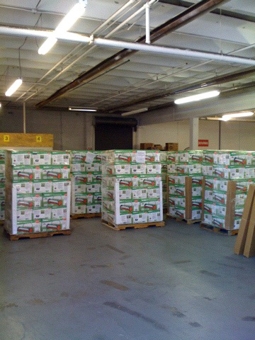Andy Humphrey started Ecomowers.com in 2006 with the goal of refining the niche “green” market even further. The store sells environmentally friendly lawn mowers and lawn equipment from its headquarters in Traverse City, Mich. Humphrey says the company’s total revenue is “under $1 million,” with sales increasing 8 percent in 2009 over 2008.
PeC: What was the inspiration for Ecomowers.com?

Andy Humphrey
Humphrey: “The inspiration was carving out a really specific niche. We didn’t want to sell lots and lots of products. We took the approach of ‘sell more of less’ as opposed to other sites that have the model of ‘sell less of more.’
“Nobody had capitalized on the concept of eco-friendly lawnmowers. Lots of people sell them, but nobody carved it out as a niche and built it up. We want to keep our product line narrow and own the category.”
PeC: Tell our readers about your operational model.
Humphrey: “Our staff includes one employee, plus me. We contract out different services including search marketing, optimization, creative design, and developments. It’s tough to find an awesome jack-of-all-trades; it’s better to work with experts in each of those fields.
“I really took the ‘build an awesome team’ approach and pulled in a combination of individuals and firms to become part of the team. We do all our customer service and daily operations in-house. We found that this makes the most sense because of our very special product line.”
PeC: Do you carry inventory or drop ship your products?
Humphrey: “We prefer to stock our inventory whenever possible. In fact, we warehouse 95 percent of our products. This gives us control over our business. We find that if you drop ship you are putting fulfillment in someone else’s hands, and you can’t monitor the quality Also, if you’re going to control a niche, you better have your product in your warehouse so you know what you have at all times and can provide excellent service to your customers.”
PeC: Now on to your website. What shopping cart do you use and why?
Humphrey: “We use the Volusion shopping cart platform, simply because it is very full-featured. [It is] easy to use, and has great support. It’s also very scalable. We’ve found that other carts may have great features, but you need a computer programming degree to figure out how to use them.”
PeC: How about design and maintenance?
Humphrey: “I designed the site and did it with one rule in mind: If a customer has a choice between shopping at Amazon.com and my store, why are they going to choose my store?
“The design and functionality of our site work together to sell our brand first, then the product. People need to buy into the Ecomowers.com movement. I realized that if a customer is only looking for the lowest price, they’re going to price-shop regardless. Our best customers are the ones who become inspired to spread the message. It’s really a grassroots effort. No pun intended.”

EcoMowers warehouse in Traverse City, Mich.
PeC: What channels of Internet marketing are you using?
Humphrey: “We have someone who manages our pay-per-click [PPC] advertising. As the expert in ecomowers, I provide a lot of input as to how trends go. We know when people buy and when to ramp up and cut back. We also monitor our return on investment and make sure we’re staying cash-positive.
“Search engine optimization is a long-term strategy that we’re starting to look heavily at now. Since our market is so niche, there is only so much we can do with PPC. Once that’s maxed out, we need organic, free traffic to be strong, too.
“We hope that the social networking sites like Twitter spread word of mouth. Twitter is becoming another search engine of sorts and if anyone searches for our keywords on Twitter Search, we want to be seen.
“Finally, we see a lot of sales come in from affiliate marketing. The ecomower movement is propelled by the ‘going green’ movement and having people promoting our site for an affiliate commission makes a lot of sense because of it.”
PeC: Your website is broken into a blog, a store and a community portal. Tell us how you’ve set that up and why.
Humphrey: “Our site is broken into three stages for the customer.
“First, we provide them with a learning environment. Our blog has been helpful to educate and provide a knowledge base. A disadvantage I’ve found with having such a slim product line is that we don’t bring in item-based search traffic. That is, people aren’t looking for one item and then buy related items or other products. We lean on our blog to help draw in people who are searching for information. We’ve designed the blog and the site to have a flawless interface.
“Second, we provide our store. We want people to take the knowledge they’ve gained and buy the ecomower that is right for them.
“Third, we want people to stick around after their purchase and participate in our community. EcoMowers.com has really branded and created a movement. This area of our business relies on community-driven content and features. Since we’re inventing a movement, we depend on the grassroots support of the community.”
PeC: Has the economy helped or hurt your business?
Humphrey: “It’s hard to say. With gas prices going up, some of our traffic maybe a result of people going to push mowers from gas-powered ones. Part of our position is: Yes, you can find a very inexpensive push-mower online, but the quality isn’t there and it may jam up or break after a few uses. For people to invest in a good ecomower, they need to understand the value. We’ve sold lower-end models that aren’t as good and we see higher product returns and lower customer satisfaction from them.”
PeC: Based on your experiences, what are some best practices you would suggest to our readers?
Humphrey: “Every business move should be made to be as cash-positive as possible. If you are going to invest in something, like adding a new product line, make sure there will be a quick return.
“Don’t buy inventory until you know you can sell it. Even if you have to buy ten of something at retail cost to make sure that people will buy it. The worst thing you could have happen is having 1,000 widgets in your warehouse that nobody will buy and you’ve paid for.
“Spend your time where you’ll get the investment back. Help customers first, before any other priorities. My best business decision was hiring our first employee. Having someone there to answer the phone and handle the front-end administration frees me up to improve the efficiency of our processes and execute strategy for stability and growth.”
PeC: What’s your biggest success to date?
Humphrey: “I’m most happy with the tremendous amount of buzz we’ve created with our brand concept. We haven’t spent a lot of money on it, but the grassroots movement has been exciting and rewarding, both financially and personally.”
EcoMowers-related Links:
- Website
- Blog
- Network



